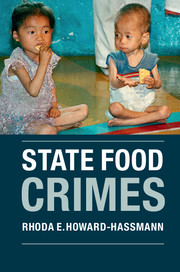6 - Venezuela
from Part II - Contemporary Case Studies
Published online by Cambridge University Press: 05 August 2016
Summary
In contrast to the horrific food policies in Zimbabwe and North Korea, Venezuela from 1999 to 2013 under the rule of President Hugo Chávez seems at first glance to have been a case of food insecurity via incompetence, Marcus’ fourth category of faminogenesis (Marcus 2003, 246). Chávez's policies were originally intended to improve the access of the poor to food. He used Venezuela's oil wealth to establish food “missions” (misiones) that distributed free food to the poor, and opened state-owned markets (Mercals) that sold food in poverty-stricken areas at subsidized prices (Gott 2011, 256–59; Jones 2007, 395). Chávez also imposed price controls on food. Thus, in the very short term he improved fulfillment of Venezuelans’ right to food.
However, food shortages became common during the later years of Chávez's presidency, yet he recklessly continued his policies. He also intentionally imposed controls on civil and political rights, thus depriving himself of the chance to respond to criticisms and rectify his policies, as the North Korea and Zimbabwean governments had also done.
Historical Background
From 1958 to 1998 Venezuela was ruled by a “pact” (Kornblith 2006, 290) that allowed the major political parties to alternate power while also accommodating the interests of minor parties. While it was based particularly in the middle classes, the pact also accommodated the interests of other social groups including organized labor, the church, businesspeople, and the armed forces. The pact's economic basis lay in “clientelistic distribution of the petroleum income” (Duarte Villa 2007, 154).
The pact encountered trouble in the 1980s and 90s. In 1983 currency devaluation ushered in a period of social and economic decline during which poverty rates rose (Kornblith 2006, 291). That same year witnessed an end to the “petro-bonanza,” or high price of oil, that had started in 1973 and had permitted government to dispense benefits to its supporters (Myers 2008, 290). The period 1987–98 was characterized by a drop in income per capita, rising inflation, depreciation of the currency, and a boom-and-bust economy that followed fluctuations in oil prices (Kelly and Palma 2004, 206–18). In 1989 shortages of basic foodstuffs along with an increase in the price of gasoline caused riots in Caracas, in which from 300 to 1,000 people were killed (Kornblith 2006, 291; Duarte Villa 2007, 157).
- Type
- Chapter
- Information
- State Food Crimes , pp. 96 - 113Publisher: Cambridge University PressPrint publication year: 2016



